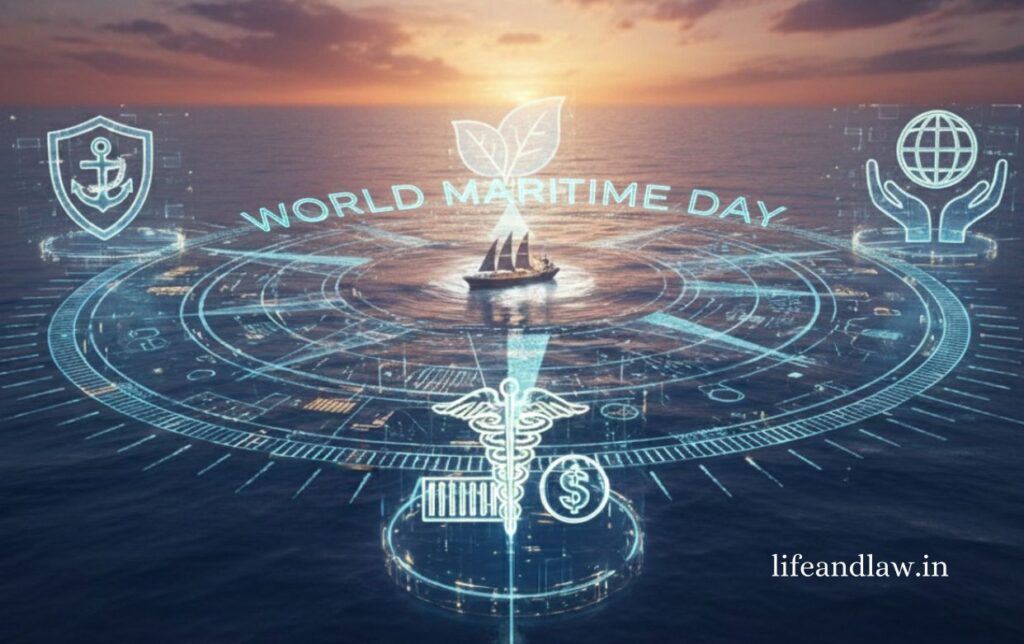Trending

World Maritime Day provides an important opportunity to highlight the importance of marine transport and its role in the global economy. Beyond the ships and trade routes, a strong legal framework is essential to the safety, security, and sustainability of marine operations.
This article dives into the key legal factors governing maritime activity, based on international treaties and Indian legal principles, and provides insights applicable to the present theme of World Maritime Day.
Maritime law, also known as admiralty law, is a body of law that governs maritime activities and offenses. Its principles are rooted in centuries of practice and international custom, aiming to ensure order and predictability in the vast expanse of the world’s oceans. Key foundational principles include:
Freedom of the Seas: This fundamental principle of international maritime law says that the waters are open to all nations and not subject to the sovereignty of any single state. It is codified in numerous international treaties and customary international law.
Sovereignty over Territorial Waters: While the high seas are open, coastal states retain control over their territorial waters, which extend up to 12 nautical miles from their shores. This sovereignty enables the regulation of navigation, environmental preservation, and resource management in these zones.
Jurisdiction: International maritime law establishes states’ jurisdictional rights over vessels, both in their territorial waterways and on the high seas. This includes the right of visitation, hot pursuit, and jurisdiction over maritime crimes.
International conventions are the backbone of global marine governance. These accords, frequently promoted by the International Maritime Organisation (IMO), address a broad range of issues:
Safety of Life at Sea (SOLAS): The SOLAS Convention is widely regarded as one of the most important international accords governing merchant vessel safety. It establishes minimal safety criteria for construction, equipment, and operations.
International Regulations for Preventing Collisions at Sea (COLREGs): COLREGs define international standards for preventing collisions between ships at sea, including steering and sailing rules, lights, and sound signals.
International Convention for the Prevention of Pollution from Ships (MARPOL): MARPOL is the major international treaty for preventing and decreasing pollution from ships, including oil, hazardous liquid chemicals, sewage, waste, and air pollution.
United Nations Convention on the Law of the Sea (UNCLOS): UNCLOS, also known as the “constitution for the oceans,” provides a comprehensive legal framework for all ocean-related activities and resources, including navigation, environmental protection, and conflict resolution.
India, with its huge coastline, places a strong focus on maritime law. The Indian legal system combines English common law, unique Indian statutes, and adherence to international norms.
The Merchant Shipping Act, 1958: This is a cornerstone of Indian maritime policy, covering numerous areas of merchant shipping such as ship registration, seaman employment, cargo transportation, and safety requirements.
The Indian Ports Act, 1908: This Act regulates India’s major ports, including port authority, pilotage, and shipping control inside port limits.
The Coastal Regulation Zone (CRZ) Notification: While not a statute, this notification under the Environment (Protection) Act of 1986 is critical for controlling coastal activities in order to conserve the marine environment.
The Admiralty (Jurisdiction and Settlement of Maritime Claims) Act, 2017: This Act consolidates and changes the law governing admiralty jurisdiction, maritime claim settlement, and associated issues, bringing Indian maritime law in line with international standards.
As highlighted by the themes often discussed around World Maritime Day, several key legal issues are pertinent to modern maritime operations:
Maritime Security: Addressing piracy, smuggling, and illegal fishing requires robust legal frameworks and international cooperation.
Environmental Protection: Ensuring compliance with MARPOL and other environmental regulations is critical to preventing marine pollution and protecting biodiversity.
Labour and Welfare of Seafarers: Adherence to international labour standards, such as those set by the Maritime Labour Convention (MLC), 2006, is vital for the well-being of seafarers.
Dispute Resolution: Efficient mechanisms for resolving maritime disputes, whether through arbitration or litigation, are essential for the smooth functioning of trade.
To stay compliant and contribute to a safer, more sustainable maritime sector, consider the following:
Stay Informed: Maintain current understanding of emerging international treaties and national marine regulations.
Compliance Training: Ensure that all workers participating in maritime operations are adequately trained on applicable legal obligations.
Seek Professional Advice: Consult maritime legal specialists if you have unique legal questions or are dealing with a difficult scenario.
Industry Associations: Engage with marine sector associations that offer resources, advice, and advocacy on legal and regulatory issues.
Maritime operations are inextricably linked to a complicated but critical legal framework that assures safety, security, and environmental protection across worldwide waterways. From international accords such as SOLAS and UNCLOS to India’s Merchant Shipping Act, the legal infrastructure serves all maritime parties, from shipowners to coastal authorities.
The author of this article is Adv. Abdul Mulla. For more information, see his legal platforms, www.asmlegalservices and www.lifeandlaw.in, where he provides resources and professional advice on legal and regulatory issues.
Adv. Abdul Mulla (Mob. No. 937 007 2022) is a seasoned legal professional with over 18 years of experience in advocacy, specializing in diverse areas of law, including Real Estate and Property Law, Matrimonial and Divorce Matters, Litigation and Dispute Resolution, and Will and Succession Planning. read more….
Copyright BlazeThemes. 2025